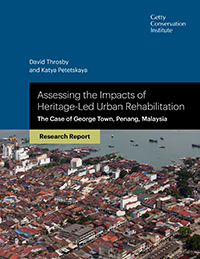
|
|
David Throsby and Katya Petetskaya, 2022
Download PDF
Print on demand (Lulu.com)
In 2019, Think City, a nongovernmental organization and Getty Conservation Institute project partner, conducted an in-depth social census in George Town, Penang, Malaysia, asking residents, businesses, and visitors about the effects of George Town’s 2008 World Heritage listing.
The Getty Conservation Institute invited Professor David Throsby and Research Project Director Katya Petetskaya of the Department of Economics, Macquarie University, Sydney, to assess the social, economic, and cultural impacts of George Town’s urban rehabilitation by studying the data from the Think City census. The authors employed an analytical methodology they previously used in Jordan, Lebanon, Saudi Arabia, and Georgia. This publication describes their methodology and provides a data-driven series of results about George Town, which are also useful for comparative analyses with other World Heritage-inscribed cities that are experiencing similar challenges.
Fifty years after the establishment of the World Heritage List, there are growing concerns about the implications of World Heritage inscription, such as intensified tourism, increased property values, and displacement of residents. This report concluded that most respondents were strongly committed to a “heritage-led rehabilitation,” as opposed to one driven by tourism development, and that despite some negative consequences, the positive results of designation outweighed the drawbacks.
How to Cite this WorkThrosby, David, and Katya Petetskaya. 2022. Assessing the Impacts of Heritage-Led Urban Rehabilitation: The Case of George Town, Penang, Malaysia: Research Report. Los Angeles: Getty Conservation Institute. https://hdl.handle.net/10020/gci_pubs_urban_rehabilitation.
|
||||||||||||||||||||